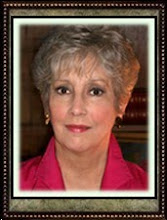Wednesday, March 31

It is my special pleasure and honor to bring you an interview with Liz Curtis Higgs.
Q: Your books are so wonderfully based on biblical characters. Your newest book, Here Burns My Candle, is an updated version of the story of Naomi and Ruth, set in 18th century Scotland. What did you learn from this biblical story in your research that perhaps you did not know before?
A: I always knew Ruth was from Moab. What I didn’t realize was how much the Israelites loathed the Moabites, since Moab, the son of Lot, was born of incest and because the Moabites were pagans, worshiping Chemosh. Oh, my. That rather changes our initial impression of Ruth, and her Scottish counterpart, Lady Elisabeth Kerr, doesn’t it?
I also discovered that Ruth’s husband’s name, Mahlon, meant “weakling” or “infertility,” which greatly impacted the characterization of Lord Donald Kerr. Every verse revealed some unexpected truth. And lest you fear the story will be too predictable, given its biblical underpinning, I promise Here Burns My Candle takes many twists and turns that even I didn’t see coming!
Q: How much research goes into one of your books? Is the research different for different genres?

A: For this novel, I began with the biblical research first, combing through nearly one hundred resource books and commentaries by various biblical scholars and teachers. Of even greater value was the time spent in God’s Word, carefully reading through the book of Ruth in a dozen translations, seeking to grasp every nuance of the original story.
Once the biblical story was imprinted on my heart, then I began researching my setting—Edinburgh—and my time period—1745—when the bonny Prince Charlie and his rebel troops rode into Edinburgh and turned the town upside down. I’m a real stickler for getting the historical facts straight, and so surrounded myself with information. I’m embarrassed to admit I own 850 books about Scotland and the eighteenth century. Crazy, I know, but there it is.
Q: You always have a new book coming out. You must be glued to your desk chair. Do you ever come up for air? What do you do as a diversion for fun?
A: Since I speak at women’s conferences almost every weekend in the fall and spring, I come “unglued” rather often! For sheer pleasure, I love reading—historical fiction and biographies in particular—as well as period films, digital photography, and traveling. In the past year I’ve had the joy of exploring New Zealand, South Africa, Nova Scotia, and Thailand. Closer to home, I enjoy singing alto in our church choir and connecting with readers on Facebook and Twitter.
Q: You are so talented at so many things, speaking and photography among them. If you could operate in only one gift, which one would it be and why?
A: Oh, Lynn, you’ve posed a very difficult question, because I truly enjoy all of the above! I love speaking and writing about the Bible, and using a generous dash of humor to do so. Watching women respond to the truth of Scripture and the grace of God is joy unspeakable. I also love being alone in my writing study, crafting a novel, sensing his divine leading as the narrative plays out.
But if I absolutely had to choose, it would be writing fiction. Even my non-fiction bestseller, Bad Girls of the Bible, is filled with storytelling. When all the research is done and a skeletal plot is in place, I open the curtain, invite the characters on stage, and start writing down everything they say and do. What could be more fun?
Q: What insider tips do you have for those newbie writers trying to get published?
A: Attend an annual writers conference—one big enough to include editors and agents among its faculty. Not only will you rub shoulders with other aspiring authors, but you’ll also learn more about the industry and where your work might be a good fit.
Attend the conference on your own so you’re forced to mingle. Resist the urge to offer opinions or brag about your talents. Simply observe, take notes, and listen. You’ll impress editors most by being attentive, not aggressive, your first time out. At the second gathering, ask intelligent questions. By your third appearance, they’ll be curious to hear what you have to offer. Then you’ll be ready to wow them.
Search the Internet on ”Writers Conference” and you’ll quickly find out what’s available and affordable. And check out the “Help for Writers” page on my website.
Above all, write for the sheer pleasure of it. Holding a finished book in our hands is wonderful, and receiving letters from readers can be very encouraging. But unless we enjoy the work itself, done in the solitude of our writing studies, we’ll be hard-pressed to finish one novel, let alone a series. As Katherine Mansfield said, “Once one has thought out a story nothing remains but the labour.” Learning to love the actual work of writing is the best insider tip I can offer.
Blessings and thanks, Lynn!
Here are some additional links where you can find Liz…
Video trailer for Here Burns My Candle
A virtual tour of my writing study
Scottish photo album: Land of the Kerrs





























